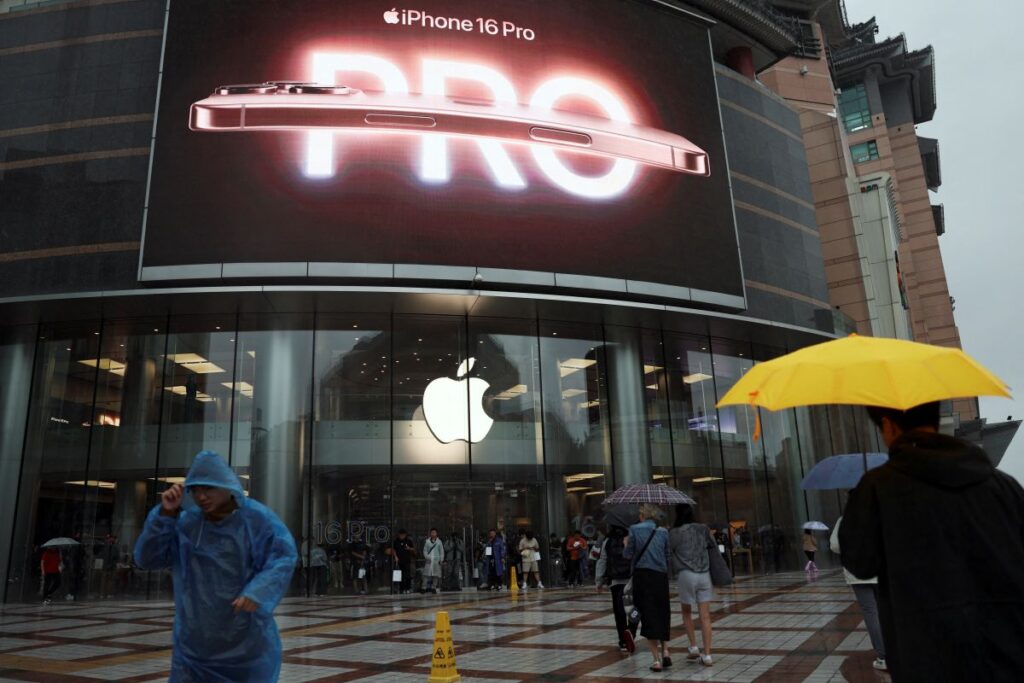Apple’s AI-powered iPhone got off to a strong start, pushing quarterly sales in line with Wall Street expectations, but a modest revenue forecast raised doubts about whether the momentum will continue through the holiday sales season.
A decline in sales in China in the fourth quarter also worried some analysts and investors, sending shares down 1.4% in after-hours, despite surprisingly strong overall profit and revenue for the period.
Chief Financial Officer Luca Maestri told analysts on a conference call that Apple expects total revenue to “grow in the low to mid-single digits” for its fiscal first quarter, which ends in December. Analysts had expected revenue to rise 6.65% to $127.53 billion during the quarter, according to LSEG.
Apple did say it expected double-digit growth in its services business in the first quarter, prompting some analysts to ask executives on the call whether overall hardware revenue could be down.
Management did not answer that question or give any indication of how the iPhone might perform, particularly in China, where Apple’s new AI features are not available. Apple has not said when they will be available.
Before management’s call with analysts, Tom Forte, an analyst at Maxim Group, attributed the fall in Apple’s share to lower-than-expected sales in China in the fourth quarter.
“We see the potential for sustained weakness in China,” he said.
Apple reported total sales of $94.93 billion in the fourth quarter, beating Wall Street’s estimate of $94.58 billion, according to LSEG data. Earnings of $1.64 per share, excluding a large one-time tax in the European Union, beat analysts’ expectations of $1.60 per share.
In the fourth quarter, sales of Apple’s iPhone, the company’s flagship product, rose 5.5% to $46.22 billion, compared with analysts’ estimates of $45.47 billion. Other product lines did not live up to expectations.
Apple’s fourth quarter ended on September 28, meaning it only reflects a few days of sales for the iPhone 16 series, which went on sale on September 20. Apple CEO Tim Cook told Reuters that iPhone 16 sales grew faster than iPhone 15 sales in a year. previously, when both phones were on sale for the same number of days in the fourth quarter.
Cook also said that Apple customers are downloading the new version of their iPhone operating system with so-called Apple Intelligence features twice as fast as a year ago.
“We’ve already had great feedback from customers and developers,” Cook said. “We’re off to a good start.”
AI strategy
The rollout of Apple’s AI strategy, which the company unveiled this year, depends on how well its new phones sell.
Rather than implementing AI in a separate app or service, Apple has rolled out Apple Intelligence in its latest operating systems as new features, such as the ability to help rewrite an email in a more professional tone. These features will mostly be available on the iPhone 16 models, which have more powerful computing chips, although both iPhone 15 Pro versions work with Apple Intelligence.
While some of these Apple Intelligence features appeared this week, others were delayed, leading some Wall Street analysts to wonder if consumers will be slower to update their devices this year until the software’s flagship features arrive.
Apple’s rivals, Microsoft and Meta, said this week that they expect further increases in spending to support their AI strategies. Apple reported that payments on property and equipment — a measure of its capital spending — rose $2.91 billion from the previous quarter to $9.45 billion.
Apple’s lower costs are partly due to the fact that it uses third-party data centers to handle artificial intelligence. Some aspects of Apple Intelligence rely on Apple’s own data centers, but the company uses its own chips to run these functions.
“Using our own silicon would obviously give us some (financial) benefit, but that’s not why we’re doing it. We do this because we can provide the same standard of privacy and security that we can provide on the device,” Cook said.
Sales in Apple’s services business, which includes iCloud storage and Apple Music, totaled $24.97 billion, compared with analysts’ expectations of $25.28 billion, according to LSEG. Mac and iPad sales totaled $7.74 billion and $6.95 billion, respectively, compared with estimates of $7.82 billion and $7.09 billion, according to LSEG.
Sales in Apple’s home and wearables business, which includes the Apple Watch and AirPods, fell to $9.04 billion from estimates of $9.2 billion, according to LSEG.
Earnings per share were 97 cents, including charges related to a multibillion-euro one-time payment of European taxes.
© Thomson Reuters 2024
(This story was not edited by NDTV staff and was automatically generated from a syndicated feed.)

